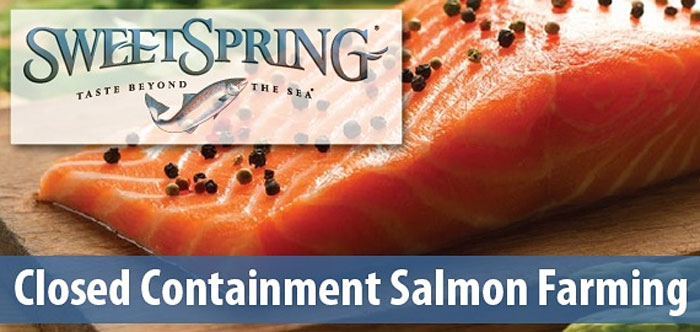
Written By: Christina Newberry
Reviewed By: Gloria Tsang, RD
Title: Registered Dietitian
Last Updated on:

Recently, HealthCastle Editor-in-Chief and Vancouver Chapter Director Gloria Tsang wrote a piece about a relatively new type of farmed salmon available in British Columbia, Canada. Since this closed containment farmed salmon is also available in some parts of the United States, we wanted to take a look at what the biggest player in seafood sustainability in Amercia has to say about it – and where you can buy it if it’s something that interests you.

Table of Contents
As you probably know, most farmed salmon is Atlantic salmon farmed in open net pens in the ocean. This type of fish farm has raised concerns from environmentalists and seafood sustainability experts because of concerns about sea lice, disease transfer to wild fish, and non-native species escape. Here’s what the Monterey Bay Aquarium’s Seafood Watch Program has to say about open net pen farmed Atlantic salmon:
“Most salmon are farmed in open pens and cages in coastal waters. Waste from these farms is released directly into the ocean. Parasites and diseases from farmed salmon can spread to wild fish swimming near the farms and escaping farmed salmon can harm wild populations. As a result, all salmon farmed in ocean net pens get an ‘Avoid’ ranking.”
The new system – closed containment fish farms – avoid the problems associated with open net pen fish farming. Because the fish are raised in closed pens on land, there is no possibility of escape or other impact on wild fish. There are still some concerns about the amount of energy these types of farms use, and about how much wild fish is required to feed the captive salmon. But both of those concerns are being worked on. Here’s what Seafood Watch has to say about closed containment farmed salmon:
“Some salmon farmers are making changes to improve their practices. So far, one change has proven successful—raising U.S. freshwater coho using inland tank-based, closed systems. Closed systems reduce environmental risks by containing pollution, disease, parasites and reducing fish escapes and result in a ‘Best Choice’ ranking.”
This type of farmed salmon is on the Seafood Watch “Super Green” list, which means that in addition to being a “Best Choice,” it also has low levels of mercury and PCBs and has the recommended daily minimum of omega-3s.
Most farmed salmon available in stores falls into the “Avoid” category. At the time of press, only one company supplying stores with closed containment farmed salmon. The brand name is “Sweet Spring,” and you can find it at some WholeFoods stores. If you can’t find Sweet Spring salmon at your local store, let the manager know you’d like to buy it.
Closed containment fish farms are not perfect. But they do meet a need and they do address many of the concerns raised about open net pen fish farms. If you’re concerned about the environmental impact of open net pen fish farms, Sweet Spring salmon may be a good choice for you.
Alumni: University of Victoria – Christina Newberry is a writer and editor whose work has appeared in national and local magazines and newspapers. With a Bachelor’s degree in English and Anthropology from the University of Victoria and a Journalism Certificate from Langara College, Christina brings keen curiosity and the love of a good story to her work with HealthCastle.com.
Christina is a passionate traveler and urban gardener with an interest in vegetarian eating and making good, tasty food from scratch. Sharing lessons learned from her own experiences, Christina writes about lifestyle topics for HealthCastle, with a focus on eating well at home and on the road.
closed containment, farming, fish, salmon, sustainable eating
Nutrition Faceoff: Nutella vs. Chocolate Cream Cheese
Artificial Colors Banned in Some Countries Found in American Kraft Mac & Cheese